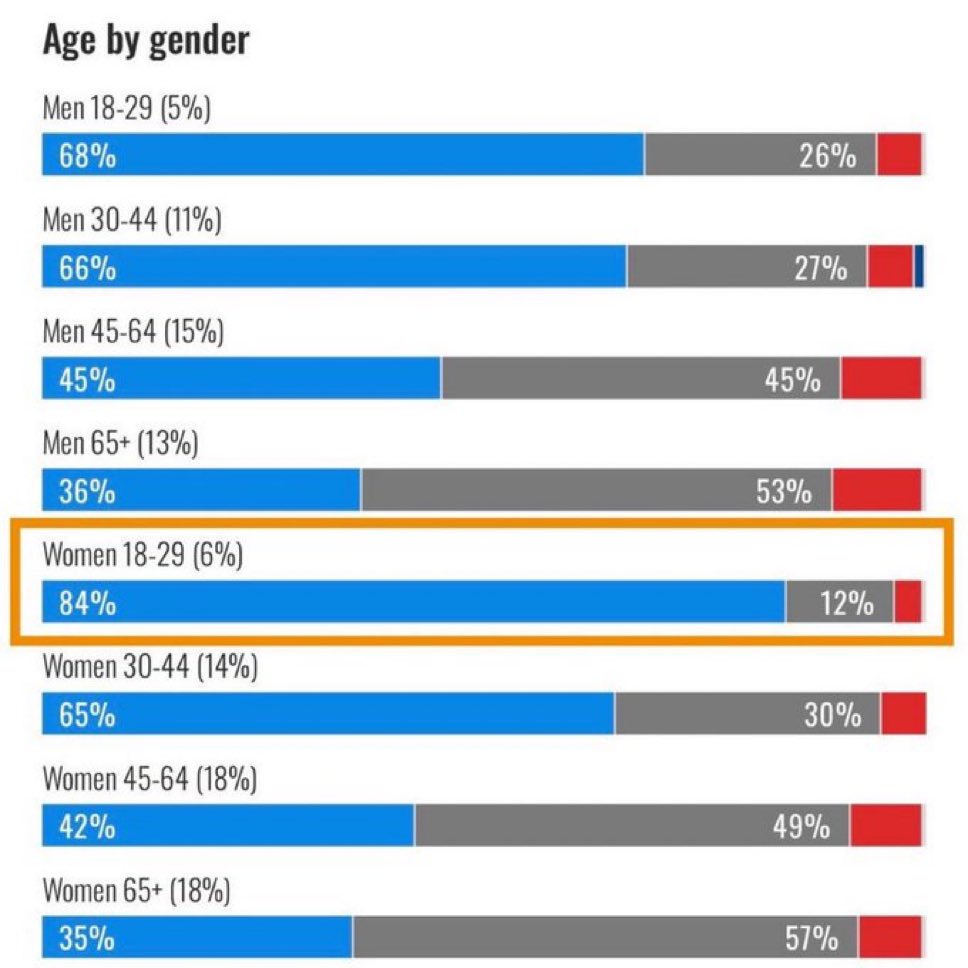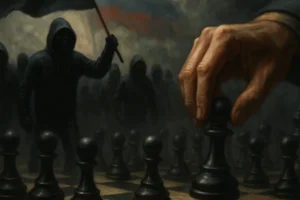When Emotion Outvotes Reason
The recent election in New York has captured national attention, not because of the typical partisan noise, but because a self-proclaimed socialist, using openly communist slogans, has taken power in one of America’s most visible cities. His campaign praised ideological revolution, called for the punishment of his opponents, and promised a future of redistribution and equality. Yet what stands out most is not his rhetoric, but who delivered his victory. Interestingly, the data show that the largest share of support came from women aged 18 to 29, with eighty-four percent of that group voting for the far-left. It makes sense.
“It was always the women, and above all the young ones, who were the most bigoted adherents of the Party, the swallowers of slogans, the amateur spies…” — George Orwell, 1984
That statistic is not an accident. It is the predictable outcome of a cultural and psychological environment that rewards emotional reasoning and punishes disciplined thought. It is also the realization of a warning that Benjamin Franklin and Alexander Fraser Tytler both understood long before America reached its current state. Franklin is often credited with saying, “When the people discover they can vote themselves money from the treasury, the republic will end.” While true, the attribution is incorrect. Nonetheless, the sentiment captures a truth first articulated by Tytler, who argued that democracy is inherently temporary because citizens eventually use the vote to enrich themselves at the expense of the state. Incidentally, Franklin’s actual warning was more precise: “Only a virtuous people are capable of freedom. As nations become corrupt and vicious, they have more need of masters.”
The point is that when emotion begins to guide the people’s will, reason loses its power, and virtue gives way to appetite. What Franklin and Tytler warned about was not simply the corruption of government, but the corruption of thought. That is precisely what we see today (on multiple levels – left and right). Of course, there are plenty of reasons for this outcome.
A few examples include the fact that the dollar has lost over 97% of its value since the creation of the Federal Reserve in 1913. The cost of living continues to rise, wages stagnate, and the tax burden grows heavier each year. Families struggle under the weight of predatory lending, speculative real estate, and a healthcare system that treats illness as a business model. Note how these hit regardless of lean, but you are made to hate the “other side” for “other reasons.” In such a climate, the promise of socialism or communism appears different and compassionate. This is especially true when those in power refuse to take action against the economic decay or the banks that sustain or even drive it.
Don’t get me wrong, I totally understand. The result speaks to the pain of the struggling and the frustration of the working class. However, beneath its moral language also lies the same emotional trap that has destroyed every society that embraced it.
Communism does not spread because it is rational. It spreads because it is emotional. It offers the illusion of fairness, belonging, and moral purpose to those who feel alienated and unheard. It gives meaning to resentment and turns envy into virtue. But this is also a huge red flag (no pun intended).
As evidenced by the voting record, the most susceptible to this message are the young, the inexperienced, and those still developing emotional maturity. This is not an insult but a behavioral observation. Younger individuals, particularly young women, tend to derive their identity and sense of belonging from moral and social approval. However, if you’ve been paying attention, they are also the same demographic that has been indoctrinated to reject partnership and embrace independence as a virtue. This sets them up for failure before they even begin. Unfortunately, when ideology cloaks itself in the language of compassion, it becomes irresistible to those who value inclusion over discernment.

The behavioral data confirm what I’m talking about. In this election, 84% of women aged 18 to 29 voted for Mamdani. However, we must come to terms with the idea that this is not a reflection of an informed ideology, but rather of emotional reinforcement. It reflects a generation conditioned to respond to moral signaling rather than policy logic. Schools, media, and social platforms amplify this conditioning by idealizing socialist and communist movements, rewarding conformity, and punishing dissent. It is not that young women are malicious or foolish. It is that they are being emotionally engineered. Federalist colleges might exacerbate this trend, but this indoctrination and manipulation begin in grade school.
Behaviorally, the process is simple. Emotion drives bias. Bias drives belief. Belief drives behavior. Behavior drives outcome. This sequence forms the core of how people are persuaded. The result was predictable. When those emotions are manipulated at scale, the republic ceases to be a system of reasoned deliberation and becomes a theater of emotional reaction. The tragedy is that those who believe they are fighting for equality often end up enforcing control on behalf of the very systems they claim to resist.
History repeatedly confirms the dangers of such emotional governance. Lenin’s Russia began with promises of equality and ended with purges, starvation, and the imprisonment of millions. Mao’s China promised liberation and delivered one of the deadliest political movements in history. Tens of millions died during the Great Leap Forward and the Cultural Revolution, as the young and zealous were turned against their elders in the name of progress. Castro’s Cuba promised dignity and delivered decay. Venezuela, once among the wealthiest nations in South America, destroyed itself through redistribution, corruption, and emotional politics. Each case began with the same emotional appeal: justice, fairness, and equality. Each ended in state violence and authoritarian rule.
The pattern is consistent because human behavior tends to be consistent. When emotional desire overcomes rational restraint, power tends to gravitate toward those who promise satisfaction rather than those who deliver stability. And despite the known failures, the promise of a solution allows for another try. The people who vote for redistribution rarely understand that they are voting for dependency. They truly believe that they are voting for an answer to the pain.
However, once dependency becomes institutionalized, freedom becomes irrelevant. And this time, the stakes might be even higher because there is potentially a radical religious element to contend with. After all, Mamdani declined to condemn the slogan ‘globalize the intifada,’ which is an Arabic word for a rebellion or uprising, and is characterized by widespread protests, civil disobedience, and violence. One can (and should) note that these are strikingly similar to the transitional phases that often accompany socialist revolutions, where moral justification masks the pursuit of control. What begins as a protest evolves into coercion, and what is framed as liberation gradually transforms into enforcement. In every instance, emotional zeal becomes the tool by which order is dismantled and tyranny takes its place.

As mentioned, we must understand that the rise of American collectivism was predictable. I’ve been warning about this very threat since about 1999. Yet, people wanted to deny the possibility altogether. Many told me that it would never happen in our lifetime, and yet, here we are, a New York Mayor explicitly calls himself a democratic socialist and tweets communist slogans, and people celebrate it. Of course, it always starts with applause, because people cheer long before they think.
Granted, the government’s own failures made it inevitable. By eroding the value of the currency, raising taxes, prioritizing foreign interests over our own, and fostering an economy dependent on debt, it created the frustration and inequality that collectivists now exploit. The uni-party has played its role in this decay. Both “sides” manipulate emotional narratives to maintain power, driving wedges between the people. Unity is lost. The vision (Constitutional understanding) is lost. Both sides present moral appeals instead of rational plans. Both distract from the fact that the middle class is being intentionally dissolved. I could go on, but in such an environment, ideology becomes a substitute for virtue. It’s crazy.
With all that said, I think it is also important to understand that the emotional voter is not inherently corrupt. They are simply responding to pain. Economic hardship, uncertainty, and cultural disorientation drive people to seek a sense of belonging and safety. However, I also need you to understand that emotion cannot sustain a free society. Freedom requires reason, discipline, and self-control, all of which we seem to be severely lacking these days. However, it also requires citizens who understand that liberty cannot survive on passion alone. When emotion governs politics, tyranny is the natural result.
The modern United States stands near the end of several known cycles. Moreover, we are plagued by apathy and dependence, with each generation becoming increasingly willing to exchange freedom for security. The current trajectory is not accidental. It’s an infection. It’s the logical consequence of moral decay and intellectual negligence. Franklin’s warning remains as relevant now as ever. A virtuous people are capable of freedom, but a nation governed by emotional indulgence will always demand masters. But he had another warning that I feel compelled to share:
“Those who would give up essential Liberty, to purchase a little temporary Safety, deserve neither Liberty nor Safety.” – Ben Franklin
Of course, the historical evidence is unambiguous. Every society that has embraced socialism or communism has ended in suffering. The ideology begins by dividing citizens into oppressors and the oppressed, creating a moral justification for state control. It centralizes authority in the name of fairness, then weaponizes fear to preserve that control. It erases merit, punishes independence, and replaces personal responsibility with collective obedience. The result is not equality but universal misery. Let me be clear: I do not believe this will be isolated to New York; it is a pattern already spreading across the country.
If this lesson is to be remembered, it must be understood through the lens of behavioral science. Emotional maturity is what separates the free from the controlled. A mature citizen recognizes manipulation. An immature one confuses passion with principle. Now you know why they target the youth. Just understand that the survival of the republic depends on which mindset prevails.
The solution is not outrage or despair. It is the deliberate cultivation of Reasoned Leadership and civic virtue. Citizens must learn to think critically, regulate their emotions, and evaluate ideas based on their outcomes rather than their intentions. Contrastive Inquiry can help. Nonetheless, liberty demands more than enthusiasm. It requires restraint, self-discipline, and courage. It calls for a population capable of choosing reason over rhetoric, principle over popularity, and truth over comfort. Yet it also requires the numbers to outweigh the emotional youth, and that imbalance is the problem dividing this nation today, because many of the emotionally mature have given up and don’t turn out to vote.
It seems that the test of this generation is whether it can recover that balance. The stage will not be determined by politicians or pundits but by the collective emotional stability of the people themselves. Freedom does not vanish in an instant. It erodes when reason falls silent and emotion takes its place. Or perhaps the frog in the boiling pot is a better metaphor. You choose.
Just remember that the responsibility of liberty belongs to those who can see beyond today. The short-sighted always seem to trade liberty for comfort. The adults must do some adulting. Indeed, Franklin was right. Virtue is the only safeguard of liberty. Without it, no law, leader, or system can preserve the republic. When emotion outvotes reason, bondage always follows.
Keep Learning: Orwell’s Warning About Feminism




